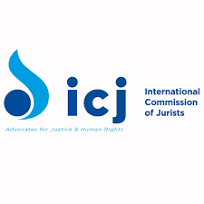With the trial of nine defendants accused of the Pylos shipwreck of 14 June 2023 scheduled to begin on 21 May, the International Commission of Jurists (ICJ) calls on the Greek prosecutorial authorities to drop the charges against the accused and to conduct an independent and effective investigation into the circumstances of the shipwreck.
The ICJ also urges the authorities to provide for necessary support for the defendants for damages they have suffered as survivors of the shipwreck.
Nine Egyptian men aged between 20 and 40 were charged by the Kalamata’s prosecutorial authorities for offences of illegal entry into the country, and illegal trafficking of foreigners.
“This prosecution is symptomatic of a systematic approach of Greek authorities criminalizing migrants, while absolving national authorities of responsibility,” said Karolína Babická, Senior Legal Adviser, Europe and Central Asia programme of the ICJ. “We have unfortunately seen such cases previously in Greece – persecution of the most vulnerable instead of protecting and supporting them and these practices must end.”
The defendants also face charges of criminal organization, causing a shipwreck, manslaughter by negligence, and endangering life under the Greek Criminal Code. They are scheduled to be tried before the Court of Appeal of Kalamata beginning on 21 May. At the same time, the Naval Court of Piraeus opened a preliminary investigation in June 2023 to examine the conduct of the Hellenic Coast Guard during the shipwreck.
The defendants, who survived the disaster that resulted in more than 600 deaths on 14 June 2023, were arrested on 16 June and have remained in pre-trial detention. According to media accounts, the accusations are based on testimonies describing the defendants as persons responsible for some tasks in the vessel like distributing water or trying to control the crowd. However, none of the defendants were accused by other survivors as being among those who profited financially from the operations.
The investigation lasted only six months and relied only on testimony from 13 persons that appeared to be generic and unauthentic. Indeed, various survivors’ statements used identical terms to describe the shipwreck. As reported to Amnesty International and Human Rights Watch, one of the survivors made a statement in front of the Coast Guard concerning the shipwreck, but observed that his statement was later changed in the transcript to say that the boat sank due to different reasons.
Survivors and various civil society organizations -including Amnesty International, Human Rights Watch, Alarmphone, and Legal Center Lesvos – claim that both the Greek Coast Guard and Frontex were aware of the situation of the ship for almost a full day before the shipwreck, yet failed to respond. Similar allegations have been brought by the group Solomon, the investigative platform Forensis, as well as journalists of the New York Times, Der Spiegel, El País, Lighthouse Reports, and the Washington Post. These testimonies also indicate that the ship was towed by a Greek coast guard boat before the shipwreck.
In its Serious Incident Report on the disaster, Frontex alleged that the rescue of the migrants was not a priority of the Greek authorities before the shipwreck.
Despite these allegations, there was no effective investigation into the responsibilities of Greek authorities. In November 2023, the Greek Ombudsman opened an inquiry into the Greek Coast Guard’s actions and omissions. This investigation was a response to the Chief of the Hellenic Coast Guard’s explicit refusal to start any administrative and internal disciplinary investigations.
At the same time, the prosecution of the Naval Court of Piraeus does not show any progress. While survivors were interrogated in the days after the shipwreck and questioned in the port of Kalamata, only two officers of the Hellenic Coast Guard were interrogated. Neither of these officers identified the defendants as potential suspects.
The European Ombudsman has recently concluded an investigation into the role of Frontex in the incident identifying various shortcomings in its rules and procedures. These problematic aspects affect the agency’s ability to fulfill its fundamental rights obligations in case of maritime emergencies. The European Parliament has also scrutinized Frontex’s lack of action and raised concerns about the prosecution.
Background
On 14 June 2023, the fishing boat Adriana capsized approximately 80 km from the Greek port of Pylos, resulting in the deaths of over 600 persons. The vessel was carrying some 750 migrants and refugees trying to reach Greece after leaving the Libyan shores. Only 104 men survived, while all the women and children on board lost their lives. Around 100 children were estimated to be on board of the Adriana boat. On 27 December 2023, the Interrogator Judge abruptly closed the investigation of the nine Egyptian survivors of the Pylos shipwreck, despite the various requests for additional evidence filed by the defence lawyers. The Interrogator Judge rejected the majority of these claiming they would fall within the competence of the Naval Court. However, as highlighted by civil society, the consideration of the additional evidence would be critical for the reconstruction of facts and the final decision.
Seven survivors reported that their phones were seized by Greek officials without having time to download or copy data. The survivors were not given any information about how to retrieve their phones and this confiscation seems to lack any clear legal basis or procedure set out in law. In late September 2023, the Coast Guard’s prosecutor also asked thirteen officials to provide their mobile phones.
For more information see: Pylos 9: Prosecution Following The Deadly 2023 Pylos Shipwreck – Legal Centre Lesvos, 12dec-Embargoed-AI-HRW-Pylos-Briefing-EUR2575182023eng.pdf (amnesty.eu), Free Pylos 9 (captainsupport.net), and The Pylos Shipwreck ← Forensis (counter-investigations.org)
This is not the first case of Greece resulting in criminal consequences for migrants and refugees or those who support them:
- For a previous ICJ statement see: https://www.icj.org/greece-criminalization-of-humanitarian-support-to-migrants-and-refugees-must-end/
- For more details on the criminalization of humanitarian assistance, see ICJ’s briefing paper here: https://www.icj.org/eu-icj-briefing-calls-for-an-end-to-criminalization-of-humanitarian-assistance-to-migrants/

